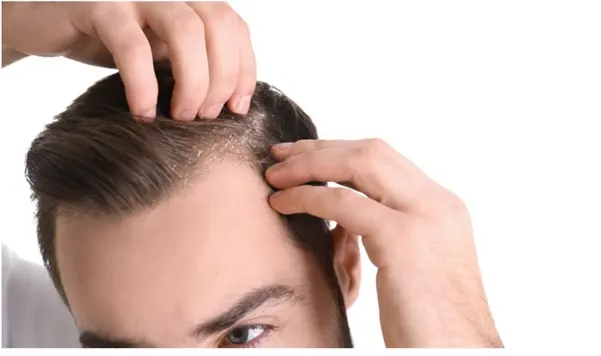Is Dandruff hereditary?

If somebody in your family is suffering from dandruff, you might not be wrong in wondering if it’s going to be passed down to you. The question of whether dandruff is hereditary, or a part of your genetic coding, is a valid concern. But trying to understand the cause of dandruff can often leave you scratching your head for more than one reason.
Is dandruff contagious or hereditary?
Greasy scalps and dandruff hereditary
How do you deal with dandruff?
What is dandruff?
Everyone rushes to use dandruff solutions and dandruff home remedies without understanding what they’re actually attacking. This is a recipe for disaster as you can have adverse reactions if you don’t know what you’re doing.
Dandruff is an ailment that affects almost half of the people on the globe. It is caused by excessive oil build-up and a naturally occurring fungus known as Malassezia Globosa. This fungus feeds on any oil build-up that is found on your scalp and breaks it down into oleic acid. Since your scalp has a large number of oil glands, you’ll often find the perfect conditions for this fungus.
If your body is sensitive to oleic acid, it can trigger a response in the shape of scalp itching, red scaly skin and flaking of dead skin cells. This flaking happens because the sensitivity triggers your body into producing excess amount of skin cells to get rid of the ‘irritant’. These dead skin cells are what we know as dandruff.
Is dandruff contagious or hereditary?
Dandruff is not contagious and cannot pass from person to person like lice. It is based entirely around your body sensitivity. And that can possibly run in your family, but you may or may not inherit it from your family members. For example, if your father has dandruff, it is not guaranteed that you will have dandruff as well. The possibility exists but it’s not 100%.
The things you can possibly inherit from your family are:
- Sensitivity to oleic acid
- Greasy or oily scalp
Sensitivity is the way your body responds to a certain situation. You can almost consider it as some form of allergy, although it is not categorised as one. Since 1 in 2 people in the world have this sensitivity, you might inherit this from your family members. It could skip a generation or two but is still quite common. Understanding this might help you manage your dandruff symptoms better.
Greasy scalps and dandruff hereditary
Your scalp becomes greasy because of the sebum or oil that is secreted by the sebaceous glands. The amount of oil secreted is controlled by various factors such as:
- Hormonal fluctuations
- Weather changes
- Stress
- Age
- Malnutrition and diet
Hormonal levels within your body can often be dictated by your genetics. Imbalances can be inherited from your parents and can lead to excessive oil production. This isn’t necessarily something you can control, but a doctor might be able to give you a clearer answer.
This can make you naturally pre-disposed to have an overactive oil gland which can lead to oil build-up, and eventually to dandruff. But the good thing about an oily scalp is that you can learn to manage it.
How do you deal with dandruff?
People have tried a whole host of methods on how to remove dandruff, and the internet is littered with various solutions. The key to managing your dandruff is to go after the two causes – oil and fungus.
You can try homemade hair masks that use the following ingredients:
These may or may not work, depending on the recipe and how your body responds to the different ingredients. Always conduct a patch test on a small part of your skin before you apply it on your hair and scalp.
The ideal solution is to use an anti-dandruff shampoo that fights dandruff causing germs. Like the Head and Shoulders Neem , which cleans your scalp and leaves it up to 100% dandruff free, getting rid of all visible flakes with regular use.



